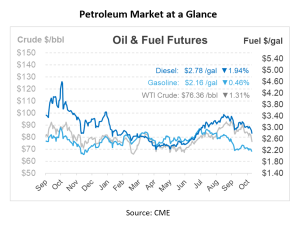
What Is It – Demurrage Charge
Have you ever glanced at your fuel invoice and spotted a demurrage charge? For those unfamiliar, it might raise questions like, “Why am I being charged extra?” or “What led to this?” Well, today’s edition of What Is It Wednesday aims to shed light on demurrage charges—what they are, why they might appear on your invoice, and how you can proactively prevent them in the future.
What is a Demurrage Charge?
Demurrage charge, in the context of the fuel industry, refers to the charges levied by a fuel carrier for any delays they face during the delivery process that are beyond their control. Think of it as a “wait time” fee. Just like you’d pay extra for making a taxi wait, fuel carriers have costs associated with unforeseen delays and, hence, charge for it.
How Can Demurrage be Incurred?
Imagine a fuel truck arriving at a facility ready to unload, but due to some unforeseen issues at the facility—like maintenance work, unavailability of storage, or administrative holdups—the truck can’t offload its cargo immediately. This means the truck and its crew are held up, waiting, even though they arrived on time and were ready to complete the delivery. Every minute they spend waiting is time they’re not spending on their next delivery or returning to refill. These delays, when beyond the carrier’s control, lead to demurrage charges.
The primary motivation for the imposition of demurrage charges is to encourage the efficient and timely utilization of a carrier’s equipment and resources. Miscommunication or lack of coordination between various parties involved in the delivery process are typically the major drivers behind these charges.
How to Prevent Demurrage Charge?
Preventing demurrage charges necessitates a combination of diligent planning, open communication, and prompt action. One essential step is ensuring that all delivery documents are precise and comprehensive. By proactively scheduling transportation, you can guarantee the timely pick-up of your fuel. Regularly maintaining and checking storage units and other equipment to prevent last-minute hitches that could delay fuel offloading is another way to prevent demurrage charges. All necessary documentation should be ready and in order before the truck arrives. Administrative delays are also a common cause of demurrage fees, but they’re easily preventable with a bit of foresight. Be well-versed with the terms of the contract with your fuel carrier. Knowing what’s included in the standard delivery time and what constitutes as “extra” can help in avoiding unexpected charges.
While demurrage charges are built to ensure the efficient functioning of the fuel delivery ecosystem, no one likes unexpected fees. By understanding their origins and adopting proactive measures, you can ensure smoother deliveries and, more importantly, an invoice that holds no surprises.
When it comes to fuel, there is no margin for error. It has to be there at the right time and at the right price – every time. Trust Mansfield and our carrier relations team as a partner to deliver your fuel supply and take the worry out of your supply logistics.

This article is part of Daily Market News & Insights
Tagged:
MARKET CONDITION REPORT - DISCLAIMER
The information contained herein is derived from sources believed to be reliable; however, this information is not guaranteed as to its accuracy or completeness. Furthermore, no responsibility is assumed for use of this material and no express or implied warranties or guarantees are made. This material and any view or comment expressed herein are provided for informational purposes only and should not be construed in any way as an inducement or recommendation to buy or sell products, commodity futures or options contracts.





